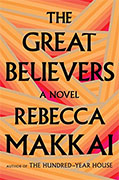The Great Believers
Rebecca Makkai
book reviews:
· general fiction
· chick lit/romance
· sci-fi/fantasy
· graphic novels
· nonfiction
· audio books
· author interviews
· children's books @
curledupkids.com
· DVD reviews @
curledupdvd.com
newsletter
win books
buy online
links
home
for authors
& publishers
for reviewers

 |
The Great Believers Rebecca Makkai Viking Hardcover 432 pages June 2018 |
|
The 1980s was a time of great sadness and anger, a time of irrefutable tenderness. But always was there dancing and hope. It was a decade of bigotry and of divisive politics. Yale Tishman, the man character in Makkai's story, attends the funeral for his best friend, Nico. Yale turns to hug Nico's sister Fiona and then his boyfriend, Richard. He's cultivated numbness to the AIDS epidemic as it takes hold. Yale's fears of dying extinguish all that he is and affirms the belief that he is unworthy of happiness. Fiona has written off her family as thoroughly as they'd written Nico off in the years before his illness. Everything Fiona has experienced in life has prepared and strengthened, and even toughened her for Nico's final goodbye.
This is only the beginning of Makkai's remarkable novel, a subtle, heartbreaking story that builds over time and has many transitions grounded in the narrator's research. She tells of the community meetings, safe sex courses, homophobia, and the vulnerability of this group of strong-minded, emotionally brittle men. Yale feels a mixture of relief, but as Richard becomes his anchor, he achieves the clarity of retrospection. This is 1981. It isn't too soon to get infected, by a long shot. This isn't San Francisco or New York: "thank God things move slower here." The first half of the novel has us siding with Yale. He's begun a new job at a prestigious Chicago art gallery and has just received a letter that details a permanent collection held by Fiona's aunt. Aging Nora Lerner is in possession of a number of pieces of modern art, most dating from the early 1920s. The paintings, sketches and line drawings include works by Modigliani, Soutine and Foujita, and an "unknown" artist called Ranko Novak, rumored to be Nora's lost love. None of the works have ever been exhibited. Nora is in poor health and cannot travel, so Yale he hopes he can travel to her home in Wisconsin and find the pieces that he thinks are obvious forgeries. While Yale's efforts to win over Nora and gain her family's trust give the novel its artistic heart, more relevant are Yale's personal travails: "ones torn smaller by every breakup, every failure and every funeral on earth." Charlie, for all his possessiveness, has spent the last four years reassuring Yale he won't run off with someone like Julian or Teddy Naples. Yale fights the persistent voice in his ear. He must tackle Charlie's betrayals head-on and be resolute that there is nothing he can't handle. Then the virus hits Chicago, "slow-motion tsunamis from both coasts." Charlie, who runs a local gay newspaper, worries not just about AIDS itself but about Yale. Yale can feel it all around him, down the corridors of hospitals around Chicago: "a thousand other men did the same." Thirty years later, Fiona tries to eliminate anger and blame as she walks the Paris boulevards, showing Claire's photo to every artist she sees. Claire's vanishing was more of a lark, first to a strange, cult-like commune with her boyfriend, Kurt, and then to Paris. For years, Fiona has blamed herself not only for Claire: "What if she had simply failed, as distracted as she was in those early years of Claire's life?" The Great Believers Originally published on Curled Up With A Good Book at www.curledup.com. © Michael Leonard, 2018 |
|
|
|
 Click here to learn more about this month's sponsor! |
|
| fiction · sf/f · comic books · nonfiction · audio newsletter · free book contest · buy books online review index · links · · authors & publishers reviewers |
|
| site by ELBO Computing Resources, Inc. | |
 In 2015, Fiona embarks on a new mission of mercy, heading to Paris to stay with Richard Campo, now a renowned artist, but whom Fiona knew from her days in Chicago. She also wants to visit her daughter, Claire, who vanished from her life several years ago. Catapulted back into her unencumbered youth, ensconced in Richard's apartment on the Ile Saint-Louis, Fiona begins her search for Claire--but not before she associates Richard with her past and her life with Nico, Yale and Richard, as well as Nico's lover, Terrence and friends, Teddy Naples and Asher Glass. Fiona would fly back to that time and place "in a heartbeat."
In 2015, Fiona embarks on a new mission of mercy, heading to Paris to stay with Richard Campo, now a renowned artist, but whom Fiona knew from her days in Chicago. She also wants to visit her daughter, Claire, who vanished from her life several years ago. Catapulted back into her unencumbered youth, ensconced in Richard's apartment on the Ile Saint-Louis, Fiona begins her search for Claire--but not before she associates Richard with her past and her life with Nico, Yale and Richard, as well as Nico's lover, Terrence and friends, Teddy Naples and Asher Glass. Fiona would fly back to that time and place "in a heartbeat."